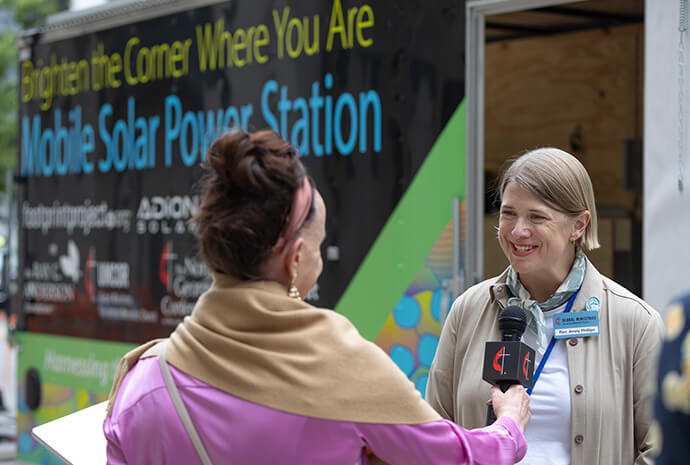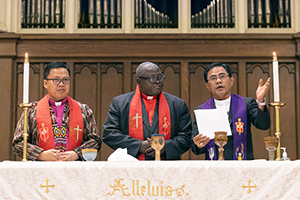Key Points:
- The Mobile Solar Power Station, a solar-powered, self-sustaining trailer, launched in October 2023 as a new ministry of the North Georgia Conference.
- The solar trailer can provide renewable energy while response teams are helping people after disasters.
- Panels line the top of the trailer, and when mission specialists get to a site, they can park and set up dozens of panels in a patch of sunshine, enabling them to convert energy from the sun into a clean, abundant, renewable-energy source.
- While some people stopped by to chat with UMCOR representatives about the new trailer, others sipped coffee — all brewed thanks to solar energy.
General Conference attendees sipped solar-powered coffee this week while learning about a new eco-friendly alternate electricity source.
The Mobile Solar Power Station, a solar-powered, self-sustaining trailer, launched in October 2023 as a new ministry of the North Georgia Conference. Its coalition of partners include the United Methodist Committee on Relief, the Ray C. Anderson Foundation, the Footprint Project and Cherry Street Energy.
“If you get hit by a hurricane and the power is out, we can get in and get the power up,” explained the Rev. Scott Parrish, North Georgia Conference disaster response coordinator and mission specialist. “We can deploy with very little notice.”
Subscribe to our
e-newsletter
The solar trailer can provide renewable energy while response teams are helping people amid disaster. Panels line the top of the trailer, and when mission specialists get to a site, they can park and set up dozens of panels in a patch of sunshine, enabling them to convert energy from the sun into a clean, abundant, renewable-energy source.
“It can power a 3,000-square-foot house, run refrigerators and medical devices, cool dialysis equipment and help medical centers, all while reducing our carbon footprint,” said Tom Staigle, disaster response volunteer with the North Georgia Conference, pointing out the heavy cords and batteries they can use to provide power.
“We bring power where there’s no power.”
Parrish said the idea arose from a conversation with the Rev. Jenny Phillips, director of environmental sustainability with the United Methodist Board of Global Ministries.
“We were at annual conference, and she told us the idea and asked, ‘Might you be interested?’”
They absolutely were interested, Parrish said. From there, they collaborated with other partners to fund the necessary equipment.
“I’ve been an advocate for transferring to renewable energy a long time, and I saw an opportunity to bring solar to what we do,” Phillips explained.
When a disaster happens, the power goes out, sometimes for a long time.
“Yet,” Phillips said, “we need power for critical life needs such as medication, batteries, food, even electric cars, which cannot run without electricity. Typically, people turn to diesel generators, but this is an earth-friendly way to solve the problem.”

Staigle said the only real cost was in building the trailer. To run it, they only need volunteers and gasoline to get to where they’re going.
It’s a brilliant idea, Staigle said. If a disaster occurs like the volcano eruption in Maui or Hurricane Katrina in New Orleans and there’s no power for a long time, the trailer can stay a while and help people in need while being environmentally friendly.
“We can roll right in and supply power,” Parrish added, especially in rural communities, which are often the last to get assistance after a disaster.
The Rev. Pat Watkins, a leader of the United Methodist Creation Justice Movement, stopped by for a tour of the solar trailer. Watkins said he appreciates how the solar trailer ministry is a practical witness to what we talk about theologically in creation care.
“It’s taking care of God’s people and God’s creation all at the same time,” Watkins said.
Others sipped coffee — all brewed thanks to solar energy — while chatting with UMCOR representatives about the effort.
The solar trailer is still so new it hasn’t yet been used for disaster relief. But they know they will need it soon, especially as forecasters expect significant amount storm activity throughout the 2024 hurricane season. Staigle said they look forward to sharing the trailer all over the southeastern United States and beyond.
In addition to helping people in times of distress, Phillips said the solar trailer “is one example of how UMCOR is living into its commitment to just and equitable net-zero emissions by 2050. We know fossil fuels contribute to climate change, which drives extreme weather events. When we use solar instead of fossil fuel in disaster response, we avoid exacerbating the climate crisis.”
For more on the solar trailer, visit the North Georgia Conference site. To learn more about The United Methodist Church’s commitment to environmental sustainability, visit the UMCOR site.
Jessica Brodie is editor of the South Carolina United Methodist Advocate.
News media contact: Julie Dwyer at (615) 742-5470 or newsdesk@umnews.org. To read more United Methodist news, subscribe to the free daily or weekly Digests.





